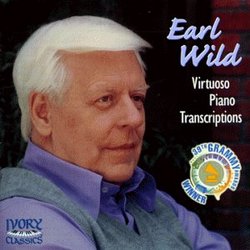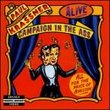| All Artists: Handel/Earl Wild, Chopin/Earl Wild, Rachmaninov/Earl Wild, Tchaikovsky/Earl Wild, Faure/Earl Wild, Bach/Earl Wild, Mozart/Backhaus, Churchill/Earl Wild, Tchaikovsky/Pabst, Strauss Jr./Tausig, Kreisler/Rachmaninov Saint-Saens/Earl Wild Title: Earl Wild: Virtuoso Piano Transcriptions Members Wishing: 0 Total Copies: 0 Label: Ivory Classics Release Date: 7/18/2000 Album Type: Original recording reissued Genres: Pop, Soundtracks, Classical Styles: Vocal Pop, Opera & Classical Vocal, Ballets & Dances, Ballets, Chamber Music, Forms & Genres, Concertos, Improvisation, Suites, Theatrical, Incidental & Program Music, Historical Periods, Baroque (c.1600-1750), Classical (c.1770-1830), Modern, 20th, & 21st Century Number of Discs: 1 SwapaCD Credits: 1 UPC: 644057090722 |
Search - Handel/Earl Wild, Chopin/Earl Wild, Rachmaninov/Earl Wild, Tchaikovsky/Earl Wild, Faure/Earl Wild, Bach/Earl Wild, Mozart/Backhaus, Churchill/Earl Wild, Tchaikovsky/Pabst, Strauss Jr./Tausig, Kreisler/Rachmaninov Saint-Saens/Earl Wild :: Earl Wild: Virtuoso Piano Transcriptions
 | Handel/Earl Wild, Chopin/Earl Wild, Rachmaninov/Earl Wild, Tchaikovsky/Earl Wild, Faure/Earl Wild, Bach/Earl Wild, Mozart/Backhaus, Churchill/Earl Wild, Tchaikovsky/Pabst, Strauss Jr./Tausig, Kreisler/Rachmaninov Saint-Saens/Earl Wild Earl Wild: Virtuoso Piano Transcriptions Genres: Pop, Soundtracks, Classical
This exceptional recording is largely devoted to Earl Wild's own dazzling piano transcriptions. Mr. Wild received a Grammy® Award in 1997 for this disc of Thirteen Virtuoso Piano Transcriptions. It is being re-release... more » |
Larger Image |
CD DetailsSynopsis
Album Description This exceptional recording is largely devoted to Earl Wild's own dazzling piano transcriptions. Mr. Wild received a Grammy® Award in 1997 for this disc of Thirteen Virtuoso Piano Transcriptions. It is being re-released on Ivory Classics® in honor of Earl Wild?s 84th birthday! Praised by critics and music lovers around the world as a "stunning document of musical sensitivity and virtuosity" and "a tribute to America's greatest pianistic treasure" ? this CD is now available in its original 24-bit HDCD state-of-the-art audiophile sound. Similar CDs
|
CD ReviewsMagnificent panorama of transcriptions Hexameron | 03/07/2007 (5 out of 5 stars) "Is there any other pianist like Earl Wild? For over 60 years he has proven to be a performing giant, making critics swoon and audiences enthralled. His recording output is even more epoch-making; his preference for peppering some odd obscurities into such recordings is a blessing. But his discography is not as significant as his phenomenal interpretations of what he plays. His ability to render Thalberg, Godowsky, Beethoven, Chopin and Rachmaninov with absolute poise, ravishing passion or thrilling bravura is what makes his recordings such a treasure. So I was enthusiastic when I first saw this particular recording, piano transcriptions that I knew would be given the best artistic treatment.
While there are a few common pieces here (Kreisler-Rach's Liebesleid and Strauss-Tausig's Valse Caprice No. 2), most of these are Wild's own piano transcriptions. His selection of pieces to transcribe is both perplexing and exciting at once: Saint-Saens, Handel, Tchaikovsky, Faure, Rachmaninov, Bach and Chopin. Throughout the entire disc, Wild is spiritually absorbed and technically brilliant. There isn't a single piece here that seems lackluster after Wild's poetic phrasing and refined virtuosity operate together. I think the most notable works here are the Saint-Saens, Handel, Chopin, Pabst and Rachmaninov. Although I've never heard Saint-Saens's Le Rouet d'Omphale symphonic poem, Wild's engrossing and virtuosic transcription conjures exorbitant drama and lyricism. The central section is rather simplistic for its repetitive theme taken through different keys, but it is still gorgeous and powerful. I found a comment in the liner-notes most interesting regarding this transcription: "As a model Earl Wild does not use Saint-Saens' own rather spare piano version, but returns to the original orchestral score, incorporating many orchestral effects into his 1995 transcription." Wild's transcription of the Larghetto from Chopin's PC No. 2 enables the piano to exhibit all of the nuances of the orchestral version. But upon hearing it, one forgets that an orchestra was even involved in the first place. It sounds like an original Chopin work, even with the noticeable difference in the agitated central section which once relied on orchestral tremolos. It would be an understatement to say Wild translates the music marvelously to solo piano. In Handel's Harmonious Blacksmith variations, Wild showcases a meticulous pianistic reproduction and doubly impresses with his exuberant performance. The Rachmaninov song "Midsummer Nights" is a rousing and passionate piece that sounds like an original piano work from the Russian master. But Pabst's Tchaikovsky paraphrase is the main blockbuster, full of beautiful intensity and exquisite reinventions of Tchaikovsky's grand themes from Sleeping Beauty. The last piece I'll remark on is Wild's own Reminiscences of Snow White, a peculiar endeavor that leaves me with mixed feelings. It wasn't my favorite piece because it sounded rather banal at times; one might even use the stereotype "elevator music." But relistening to it many times at least reveals to me that Wild superbly unifies Churchill's Disney themes. And he is in his prime when he embellishes the themes with dazzling flights in the style of a 19th century virtuoso. While the rest of these pieces deserve commentary, I think they pretty much speak for themselves. Bottom line: This repertoire may not look interesting at a first glance, but I implore the reader to sample this. You'll not only find hidden gems (Mozart-Backhaus, Strauss-Tausig and Pabst) but also some glorious transcriptions from Wild's pen (Saint-Saens, Handel and Chopin)." |

 Track Listings (13) - Disc #1
Track Listings (13) - Disc #1

